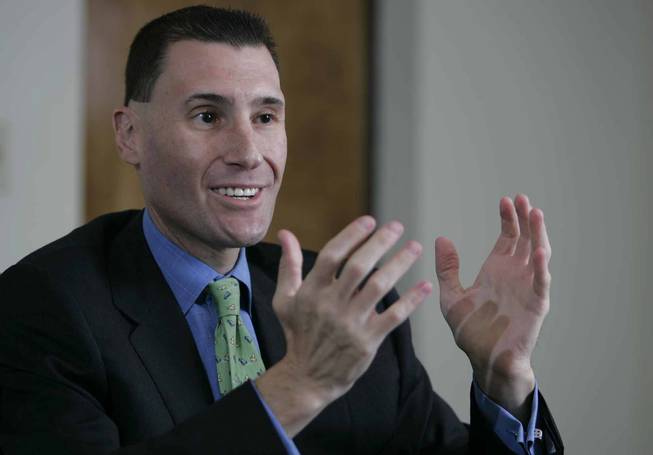Thursday, Sept. 2, 2010 | 2 a.m.
Audio Clip
- Butera on the restructuring process
-
Audio Clip
- Butera on employee morale
-
Audio Clip
- Butera on growing casino competition around the country
-
Audio Clip
- Butera on his faith in a Las Vegas recovery
-
While some casino employers battle labor unions, Tropicana Entertainment CEO Scott Butera makes peace with them. Butera was a Wall Street investment banker who left after 14 years to restructure Donald Trump’s ailing casino company in 2002.
He’s a pragmatist with a Mr. Fix-It reputation who thinks Chapter 11 is preferable to postponing debt obligations, as some companies have done.
Since 2008, Butera has been repairing damage at Tropicana Entertainment, a mismanaged company bought out of bankruptcy this year by investors, including Carl Icahn. Icahn, who won the stalled Fontainebleau resort at auction, has generated profits of more than $1 billion by turning around cash-strapped casino companies.
With nine casinos in five states, Tropicana Entertainment was the first major casino company to exit from Chapter 11 since the recession. After reducing debt by $2.5 billion in bankruptcy, it reported an operating profit in the second quarter.
This wasn’t just a financial restructuring but a complete management overhaul. What did that accomplish?
When I got here the company was broken, both front of house and back of house. People were in positions they shouldn’t have had, they weren’t trained to do their jobs well or they weren’t ethical. Because of the bad economy we were able to recruit good managers for all our properties, as well as a new corporate team. As a result, we were able to increase our bottom line despite a significant drop-off in revenues.
Did you set out to clean house?
When you have a company in as tough a shape as ours was, there’s a pretty good chance you’re going to need to replace a lot of people. But it wasn’t like we came in to clean house and anyone who was with the old company was collateral damage. We spent a lot of time talking to people and finding out who was valuable. Some people we wanted to keep ended up leaving for other opportunities. When you’re turning around a company, there’s never nirvana from Day One. We evaluate people and make sure they perform. And we’re not afraid to make changes.
Workers are afraid for their jobs. What are you doing to reassure workers, in light of cutbacks under previous management?
Morale was really bad when I joined the company. A lot of workers had suffered through broad layoffs that weren’t strategic: They were in the wrong place at the wrong time, which is the worst of all worlds. Our team members are our most important asset. You can’t employ as many people in tough times, but we communicate with employees so there are no surprises. It’s hard to handle bad news when it’s a total shock. I spend a lot of time with employees and managers explaining where we are going as a company. Morale is something you always have to work on, because it doesn’t take much to have a bad experience.
How is your employment picture?
You can accomplish reductions without layoffs through attrition if you’re patient and take a long-term view. In tough times, you end up with less people and those people work harder. Now that we’re a healthier, well-capitalized company post-bankruptcy, employment is pretty stable. There will always be a home for talented, hardworking people. If you’re very good at what you do and enthusiastic, we need you more than ever. The employee who is biding his time, wishes he had another job or is upset about his pay is at risk.
Will the recession permanently dampen casino spending?
No. People are creatures of habit. They like what they like. And we live in a consumer-driven economy. People work hard and they want to spend money and have fun. Consumer spending is down, yet a company like Apple is hitting all-time highs because it has a great product, its stores are fun and its employees are well-informed. We should be able to do the same.
What do casinos need to do differently?
You can’t chase profits or buy business. If you had a business that made $1 billion and now makes $700 million, that doesn’t mean it’s not a good business — you just can’t have $800 million in costs. You have to give people a reason to go to your casino. You have to create a personal touch with your customers. It’s a cliché that casinos provide great service. Everyone says that when times get tough, but some do and some don’t. The ones that do can create loyalty even when their properties are not in top form. And you have to accept that the business has become more local. We send mailers to a smaller radius of customers because of nearby competition and we’re smarter about what people want. Rather than spending money on a lounge act people might not care about, we’re giving customers a free night in the hotel or a free buffet.
CORRECTION: This story originally mistakenly reported that investors including Carl Icahn bought Tropicana Entertainment out of bankruptcy last year. They bought the company out of bankruptcy this year. | (September 3, 2010)


Join the Discussion:
Check this out for a full explanation of our conversion to the LiveFyre commenting system and instructions on how to sign up for an account.
Full comments policy